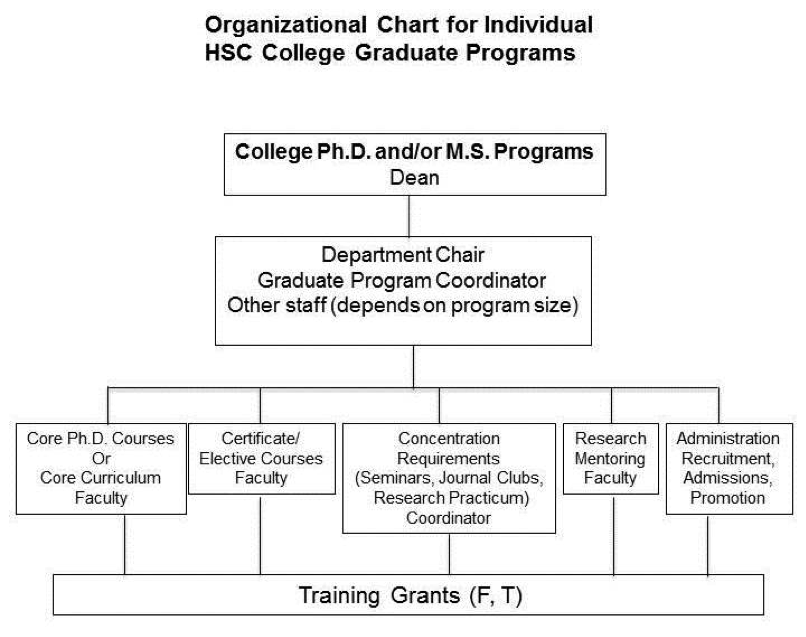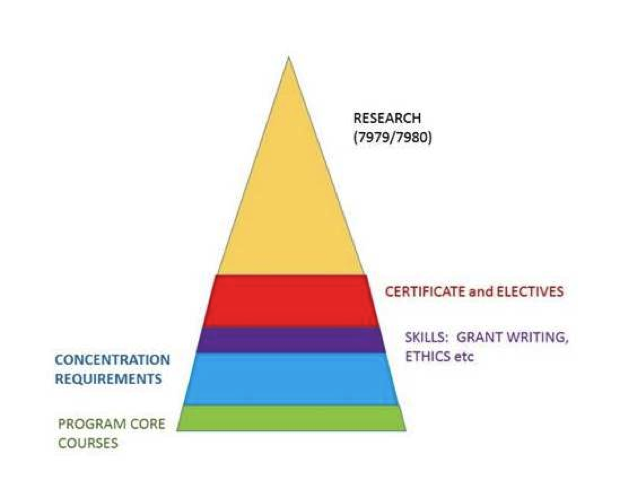Under the UF Health
Forward Together strategic plan, the key goal in education was to update professional curricula across the academic health center colleges to include more small group learning, simulation, early clinical experience, interdisciplinary training and other innovations. While much work remains in these areas, which will continue to be at the core of the education mission in our health colleges, efforts during the period 2009-2014 have established a clear roadmap and effective infrastructure. Under the
Power of Together strategic plan, in addition to continuing these efforts in professional education, a new area of focus is graduate education, especially Ph.D. training.
There are 23 Ph.D. programs enrolling 540 students across the health colleges. We decided to start with the Interdisciplinary Program in Biomedical Sciences, or IDP, the Ph.D. program in laboratory-based biomedical science based in the College of Medicine and College of Dentistry. This is the largest of our doctoral programs, currently including 198 Ph.D. students. A committee of scientists who are actively involved in graduate education was appointed by myself and Tom Pearson, M.D., M.P.H., Ph.D., executive vice president for research and education. This committee, chaired by Henry V. Baker, Ph.D., the Hazel Kitzman professor and chair of the department of molecular genetics and microbiology in the College of Medicine, met 21 times between April 2015 and April 2016, including one retreat. Committee members are listed at the end of this newsletter. Their report establishes the framework for what will now be called the “UF Graduate Program in Biomedical Science.”
While the details of the committee’s work can be found in their
preliminary report, in this newsletter I will summarize the key recommendations below. A town hall meeting of graduate biomedical science faculty was held on May 23; faculty members were engaged in the process and made excellent suggestions. These recommendations are tentative and Dr. Baker invites additional feedback before the final report is released.
Scope:
It was initially envisioned that the UF Graduate Program in Biomedical Science would encompass laboratory-based Ph.D. programs in the College of Pharmacy and the College of Veterinary Medicine, in addition to the College of Medicine and the College of Dentistry. The idea that students in all of these colleges would pursue their graduate education under an integrated administration with a common core curriculum was considered, but discarded on the basis that Ph.D. programs in pharmacy and veterinary medicine were highly specialized, requiring their own curricula and administration. Thus, the Graduate Program in Biomedical Science will encompass laboratory-based Ph.D. students in the College of Medicine and College of Dentistry. Of course, Ph.D. students in the College of Pharmacy and College of Veterinary Medicine will be able to take pertinent courses in the GPBS, and there is envisioned a common set of infrastructural elements across all Ph.D. programs at the academic health center, including an Interprofessional Skills Curriculum featuring courses pertinent to all Ph.D. candidates (e.g., Ethics and Responsible Conduct of Research, Communications, Cultural Competency, Principles of Teaching). Our Office of Graduate Programs will also provide educational support for all our Ph.D. programs, including Ph.D. curriculum development, review and evaluation, management of graduate certificates, training of graduates, career development and placement, and marketing (see below).
Admission process: A major strength of the current biomedical graduate program for many students who have not yet decided on a particular area of concentration is the rotations they take through several laboratories before deciding on a discipline and mentor. While it is desirable to continue such an approach for “undifferentiated” students, many faculty members who serve as graduate student mentors have commented that undergraduates with a specific interest in pursuing Ph.D. studies in their laboratories have difficulty with the current admission process and early graduate experience, which treats
all graduate students as though they have not yet decided on a scientific direction and mentor. Thus, a hybrid approach was recommended. The Graduate Program in Biomedical Science admissions committee would screen all applicants and select those who meet rigorous academic standards. Selected candidates would then follow two pathways. A certain number of places would be set aside each year for “undifferentiated” applicants who would follow the current model of several lab rotations, after which they would choose a mentor. As an alternative pathway, students who have specified a preferred scientific area and laboratory mentor would be forwarded to the faculty in that area and that faculty member, who would select their choice of students subject to the constraint of available grant funding. Students would rotate through that lab and, if there is mutual agreement, may elect to forego additional rotations. In all cases, students who begin in a particular lab but who have a change of heart about their research direction will have the opportunity to transfer to another lab during the course of their training.
Marketing: In order for prospective graduate students to learn about the opportunities for graduate education in biomedical science at the academic health center, a major marketing effort will be undertaken, concentrating on how we present ourselves to prospective students and identifying ways to best attract them. These efforts will include focusing on our website, social media efforts, online marketing, video development and developing print collateral to create a family of materials to help sell our programs.
Certificates: The committee encourages faculty in thematic areas of research to develop
Graduate Certificate Programs. Such certificates have numerous advantages, including, as outlined in the committee report:
- They highlight our educational and research strengths.
- They are recognized by the Graduate School and may be used to facilitate multidisciplinary and cross-college training programs.
- They promote multidisciplinary team based learning in areas of research excellence.
- They highlight areas of research excellence across the health system that can be used to market the program to its full potential.
- They provide a platform for training grants where expertise coalesces around a research strength.
- They preserve discipline-based training, which is critical for long-term gainful employment.
- They allow individual college programs to continue and build their unique strengths.
- Certificate programs are nimble. They can be quickly developed to respond to emerging research areas as new faculty are recruited and easily eliminated when there is no longer strength due to a research area waning or faculty attrition.
- They give students more choices and more options for additional specialized training, which increases their ownership of their individual development plan, allowing them to tailor their training, not just at the level of choosing a mentor but also in selecting educational opportunities in areas of research excellence.
- They give faculty diverse options to create novel curricula.
Suggested areas for development of Graduate Certificate Programs include diabetes, cancer and aging, and some such as biomedical informatics already exist. Many others are possible and may be advanced by faculty in research centers, areas of preeminence, existing T32 programs (e.g., cardiorenal medicine) or emerging areas of research focus. These should be developed by faculty across disciplines and include faculty from multiple colleges. The coursework should include rigorous science and develop team science skills in the graduate students. T32s should then be developed in each of these research areas.
Areas of Concentration: The committee recommended that the Graduate Program in Biomedical Science be organized on the basis of discipline-based training programs housed in and administered by the academic basic science departments: Anatomy and Cell Biology; Biochemistry and Molecular Biology; Molecular Genetics and Microbiology; Neuroscience; Oral Biology; Pathology, Immunology and Laboratory Medicine; Pharmacology and Therapeutics; and Physiology and Functional Genomics. The basic organizational structure recommended by the committee is as follows:
 Plan of Study
Plan of Study: The committee created the following figure to capture the recommended principles of graduate education, built on foundational core courses in each college (e.g., medical, pharmaceutical, veterinary science); concentration-specific study to assure depth of knowledge; cross-cutting competencies such as ethics, writing, professionalism and career development; and deep immersion in original research.

Schematic of graduate education at the academic health center to conceptualize the committee’s view of the principles of graduate education
The
UF Ph.D. Programs Policies and Recommendations recently adopted UF-wide were enthusiastically endorsed. They codify best practices on recruitment and admission, student orientation, advising, the requirement of individual development plans, monitoring of programs, professional and career development, alumni follow-up, diversity and inclusion, and mentor development.
Dr. Pearson and I would like to thank Dr. Baker and members of the Graduate Program in Biomedical Science committee for their thoughtful recommendations regarding graduate education in biomedical science at the University of Florida. These recommendations were reviewed by the associate deans for education and research for the health colleges as well as leadership responsible for current Ph.D. programs. Graduate faculty have had the opportunity to offer suggestions at the May 23 town hall meeting, many of which are being incorporated into the final recommendations. Further feedback is encouraged.
We believe that implementation of these recommendations will attract excellent graduate students who will receive superb training that will prepare them for a diverse array of potential career paths. We hope to implement the marketing initiative this summer and the new admissions process for the upcoming cycle. The remainder of the recommendations will be implemented for the following year.
The Power of Together,
David S. Guzick, M.D., Ph.D.
Senior Vice President for Health Affairs
President, UF Health
Membership of the Committee on Graduate Education in Biomedical Science: Henry Baker, COM (chair), Mark Atkinson (COM), Ashley Brown (COM), Bob Burne (COD), Pat Concannon (UFGI), Yehia Daaka (COM), Todd Golde (COM), Maureen Keller-Wood (COP), Jeff Martens (COM), Lauren McIntyre (COM), Duane Mitchell (COM), Laura Ranum (COM), Dietmar Siemann (COM), Charlie Wood (COM), Ammon Peck (CVM), Wayne McCormack (COM), Mike Clare-Salzler (COM), Rob McKenna (COM), Phillip Doerfler (COM), Justin Kaspar (COM) and Kim Hawkins (COM).
 Plan of Study: The committee created the following figure to capture the recommended principles of graduate education, built on foundational core courses in each college (e.g., medical, pharmaceutical, veterinary science); concentration-specific study to assure depth of knowledge; cross-cutting competencies such as ethics, writing, professionalism and career development; and deep immersion in original research.
Plan of Study: The committee created the following figure to capture the recommended principles of graduate education, built on foundational core courses in each college (e.g., medical, pharmaceutical, veterinary science); concentration-specific study to assure depth of knowledge; cross-cutting competencies such as ethics, writing, professionalism and career development; and deep immersion in original research.
 Schematic of graduate education at the academic health center to conceptualize the committee’s view of the principles of graduate education
Schematic of graduate education at the academic health center to conceptualize the committee’s view of the principles of graduate education